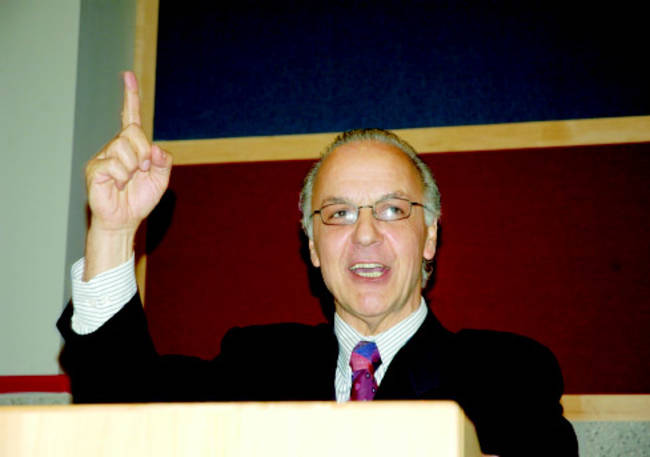


There are questions of identity and questions on how identity can be built and strengthened. In the case of Italian/American identity, its construction passes through another phase. With stories handed down orally, as with word-games, part of original, essential meaning inevitably gets lost.
We mention this to introduce someone who might stimulate debate, as his arguments are more the exception than the rule. He is Peter Carravetta who, beginning last semester, holds the Alfonse M. D’Amato Chair at Stony Brook University [2]. He was officially nominated a week ago at a ceremony held on Long Island at the university’s campus. Before going into detail, we feel it is necessary to give the reader a sense of his point of view; for Carravetta, an identity is built through primary sources and not through someone else’s interpretations.
This is the reason why his ambitious project aims to offer coming generations what he refers to as raw material. Professor Carravetta’s path is exactly consistent with that of many of his colleagues who work in the same field of studies. However, unlike them, Carravetta was born in Italy in 1951 in a village in the province of Cosenza. He came to the United States as a twelve-year-old with the awareness, conscious or unconscious as it might have been, of being Italian.
Even his family’s immigration differs from many others since his parents arrived in the United States already at the age of retirement. “I was the last of six children,” Carravetta tells us, “and my father in turn had ten brothers, six of whom had immigrated to the United States before the First World War. When I arrived in New York, in particular in the Bronx, I Americanized myself immediately. Let’s say I didn’t live in Little Italy and in a year’s time I spoke perfect English and achieved great results in school. In this, my initial Italian education helped me.” As it often happens, adolescent aspirations totally change in adulthood and Professor Carravetta, who once had a passion for science and aeronautics, started studying literary disciplines and graduated with a degree in the History of American Literature.
“Sciences deluded me,” Carravetta explains, “because they only offered the chance to work for a corporation or for the army and I felt as if my inner self would have been nullified. Literary disciplines, instead, let me discover a creative vein and so I started writing both in Italian and in English. Then at a certain point I discovered Dante and I started attending a course on the Divine Comedy.” Then, as for many Italian/Americans, a trip to Italy became an opportunity to have many new experiences, all the more for Carravetta who had never been to any other Italian city, except for Bologna.
“In Bologna I discovered a new world,” he comments. “I found myself in front of an ancient and, at the same time, really modern Italy. Then, after a year’s time, I came back to the United States, I applied to New York University and started a PhD in French and Italian and, thanks to another scholarship, I went to live and study in Milan.” In 1983 Carravetta was appointed Assistant Professor of Italian at Queens College CUNY [3] and in 1991 he was appointed Chair. He has remained there until the beginning of this year, when he became the first Alfonse M. D’Amato Professor in Italian and Italian American Studies at Stony Brook University.
What is it that inspires Professor Carravetta’s thoughts? His approach is first of all a philosophical one as he himself explains: “At a certain point I noticed that nobody knew Italian contemporary thought, while Italian/Americans should know their own history, especially the post-unification period. Moreover, the question of recuperating Italian identity requires deeper study together with historical research and the use of more appropriate critical elements. As an example, instead of continuing to insist on a double identity, why not accept the fact that the real problem is the existing gap between Italians and Italian/Americans?”
At this point Carravetta might also appear to be a destructuralist since he even says: “Nowadays there is a lack of a hermeneutic model able to make people aware of the non-existence of an identity. It is more a political than an identity question when it comes to Italian/Americans. In fact we are several persons at the same time, we are multi-perspective, we are Italians, Americans, both, or something else. Once and for all we must get over the question of identity and start talking about international community.”
The Alfonse M. D’Amato Chair, as he himself confessed to us, is a prestigious recognition for Carravetta. “I am very proud of it,” he says, “and I am out to radically re-launch studies in the Italian/American sector and also to ask uncomfortable questions.
This Chair also gives me the chance to start working on a project I have been thinking about for many years, that is The Italian American Archive, with the intent to relate, in several volumes, the social and cultural history of the Italian/Americans since 1870 until today, with a particular emphasis on the first decades considering that the greatest part of that material has been forgotten. All this documentation must be put at the students’ disposal to make them aware of the complexity of their past.” Besides this ambitious project, Carravetta is preparing a symposium on Italian/American criticism which will take place on October 3-4, 2008.
(Translated by Marina Melchionda [4]. Edited by Giulia Prestia [5])
Italian version published in "Oggi 7" (05/18/2008)
Source URL: http://ftp.iitaly.org/magazine/focus/art-culture/article/raw-material-reconstruct-identity
Links
[1] http://ftp.iitaly.org/files/carravetta1211161867jpg
[2] http://www.stonybrook.edu/
[3] http://www.qc.cuny.edu/
[4] http://www.i-italy.us/profile/Marina85
[5] http://www.i-italy.us/profile/GiuliaPrestia